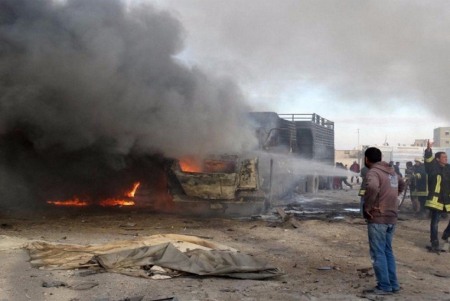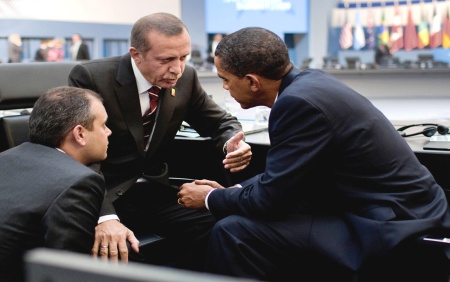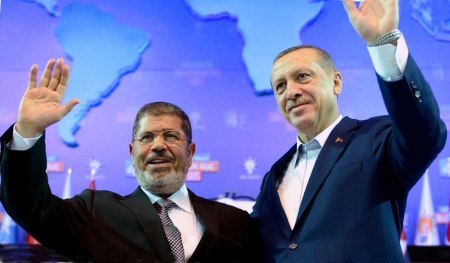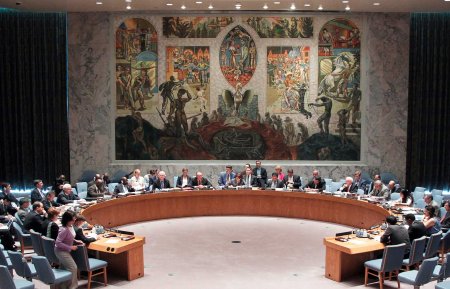Turkey insists, that the Russian crew was warned 10 times in the space of five minutes before action was taken but also says that the plane was just 17 seconds in Turkish territory. This is a clear contradiction.
Captain Murakhtin: ”All our mission flight was in my personal full control until the explosion of the missile. There were no warnings either via radio communication or optically. There were no contacts at all. That’s why we flew heading combat course as per normal.”
Acording to Syrian sources Russian planes conducted massive attacks on the positions of Turkmens in the region where the Russian Su-24 was brought down. The source reported that most likely nothing remains of the militants who killed the pilot and shot down the Russian MI-8 helicopter.
New Information suggest that the Turkish air force is not putting their fighters in the air after the majority of them were lit up by Russian missile radar (S-300 or possibly S-400). According to a statement of the Russian Ministry of Defense, Turkey is afraid that their planes would be destroyed when approaching the border.
The Russian forces hope that they are now able to unhindered destroy Islamic fighter camps in the border territory and annihilate retreating militants and fuel trucks which are moving towards Turkey.
Russia considers an increase of the air group in Syria to 70 aircrafts. Most air raids will be carried out under the cover of fighter planes SU-27 and SU-30CM.
Russia hit a parking lot for trucks waiting to go through Bab al-Salam, a major rebel-controlled border crossing between Turkey and Syria. This is one of Russia’s closest air strikes to Turkish soil, targeting a vital corridor into rebel-held Syria and a lifeline for Islamic terror groups.
Videos have emerged of burning trucks and panicked onlookers in the aftermath of Russian air strikes in Azaz near the Turkish border. Turkish media claims, that the airstrikes killed at least seven of the truck drivers. An IHH (Humanitarian Relief Foundation) Twitter account notes that the organization had a team in Azaz to assist and extinguish the fires.
IHH has been linked to al-Qaeda and has been repeatedly caught in illegal activities. In 1997 a search of the organization’s Istanbul office yielded the discovery of firearms, explosives, and bomb-making instructions.
In 2014 an IHH truck was stopped at the Syrian border and discovered to be loaded with weapons. Turkish police raided an IHH office as part of a crackdown against individuals with links to al-Qaeda. Most recently, IHH has been investigated in Bosnia-Herzegovina for exporting weapons to Syria.
Erdogan did not receive the expected support from NATO. Turkey has acknowledged that if the Russian plane even violated the border of Turkey, this was for only for 17 seconds, which means that the Turkish Air Force, on purely physical grounds, could not have reacted to it if the provocation was not prepared in advance. This figure of 17 seconds appears in NATO reports.
Members of NATO have been ambiguously treating Erdogan’s action. At present it is difficult to judge how the situation will develop. While it is obvious that Erdogan is attempting to back off, it is already too late, as Vladimir Putin gave to understand at a meeting with the king of Jordan.
According to an official Russian statement:
“Russian Foreign Minister Sergey Lavrov reminded his counterpart Mevlut Cavusogluto about Turkey’s involvement in IS’ illegal trade in oil, which is transported via the area where the Russian plane was shot down, and about the terrorist infrastructure, arms and munitions depots and control centers that are also located there.”
Retired French General Dominique Trinquand reaffirmed Lavrovs position, saying that “Turkey is either not fighting IS at all or very little, and does not interfere with different types of smuggling that takes place on its border, be it oil, phosphate, cotton, or people”.
Investigations by independent journalists about IS oil trade have repeatedly led to one name: Bilal Erdogan, the son of Turkish President Recep Tayyip Erdogan.
Wikipedia:
After graduating from Kartal Imam Hatip High School in 1999, Bilal Erdogan moved to the US for undergraduate education. He earned a Masters Degree in the John F. Kennedy School of Government at Harvard University in 2004. After graduation, he served in the World Bank as intern. He returned to Turkey in 2006 and started a business career. Bilal Erdogan is one of the three equal shareholders of BMZ Group Denizcilik ve Insaat Sanayi Anonim Sirketi, a marine transportation corporation.
BMZ Ltd is in fact a family business, and shares are hold by President Erdogan’s close relatives who in this context also misused public funds and took illicit loans from Turkish banks.”
The Turkish government buys oil which is being produced from Iraqi and Syrian oil wells that IS has seized. Bilal Erdogan’s maritime company owns special wharfs in the ports Ceyhan (southern Turkey) and Beirut (Lebanon) that are transporting smuggled IS crude oil in tankers to Israel, Europe, and Japan.
This is not the only family connection of the Turkish president to terrorism. His daughter Sumeyye Erdogan runs a secret hospital camp near the Syrian border where Turkish army trucks daily bring in scores of wounded IS fighters to be patched up and sent back to Syria, according to the testimony of a nurse who was recruited to work there until it was discovered that she was a member of the Alawite branch of Islam.
Since September Russia has tried to get additional legal support for its air campaign in Syria from the UN Security Council. The USA tried to sabotage this diplomatic move and could it delay for some weeks but in the wake of the IS terror attacks in Paris Russia was able to obtain UN backing with the help of France.
The USA was not in the position to veto this resolution, backed by its ally France, but US ambassador Samantha Power, a diehard neocon, stood away from the vote. The passing of this anti-terror resolution was more than Samantha Power could bear.
The resolution not only approves Russia’s military campaign (“using all necessary means”), but it makes clear that Russia is fully entitled to extend the air campaign to “all other individuals, groups, undertakings, and entities associated with Al-Qaeda, and other terrorist groups”. Jabhat al-Nusra is explicitly mentioned.
United Nation Security Council resolution 2249 (2015)
“Reaffirming its resolutions 1267 (1999), 1368 (2001), 1373 (2001), 1618 (2005), 1624 (2005), 2083 (2012), 2129 (2013), 2133 (2014), 2161 (2014), 2170 (2014), 2178 (2014), 2195 (2014), 2199 (2015) and 2214 (2015), and its relevant presidential statements,
“Reaffirming the principles and purposes of the Charter of the United Nations,
“Reaffirming its respect for the sovereignty, territorial integrity, independence and unity of all States in accordance with purposes and principles of the United Nations Charter,
“Reaffirming that terrorism in all forms and manifestations constitutes one of the most serious threats to international peace and security and that any acts of terrorism are criminal and unjustifiable regardless of their motivations, whenever and by whomsoever committed,
“Determining that, by its violent extremist ideology, its terrorist acts, its continued gross systematic and widespread attacks directed against civilians, abuses of human rights and violations of international humanitarian law, including those driven on religious or ethnic ground, its eradication of cultural heritage and trafficking of cultural property, but also its control over significant parts and natural resources across Iraq and Syria and its recruitment and training of foreign terrorist fighters whose threat affects all regions and Member States, even those far from conflict zones, the Islamic State in Iraq and the Levant (ISIL, also known as Da’esh), constitutes a global and unprecedented threat to international peace and security,
“Recalling that the Al-Nusrah Front (ANF) and all other individuals, groups, undertakings and entities associated with Al-Qaida also constitute a threat to international peace and security,
“Determined to combat by all means this unprecedented threat to international peace and security,
“Noting the letters dated 25 June 2014 and 20 September 2014 from the Iraqi authorities which state that Da’esh has established a safe haven outside Iraq’s borders that is a direct threat to the security of the Iraqi people and territory,
“Reaffirming that Member States must ensure that any measures taken to combat terrorism comply with all their obligations under international law, in particular international human rights, refugee and humanitarian law;
“Reiterating that the situation will continue to deteriorate further in the absence of a political solution to the Syria conflict and emphasizing the need to implement the Geneva communiqué of 30 June 2012 endorsed as Annex II of its resolution 2118 (2013), the joint statement on the outcome of the multilateral talks on Syria in Vienna of 30 October 2015 and the statement of the International Syria Support Group (ISSG) of 14 November 2015,
“1. Unequivocally condemns in the strongest terms the horrifying terrorist attacks perpetrated by ISIL also known as Da’esh which took place on 26 June 2015 in Sousse, on 10 October 2015 in Ankara, on 31 October 2015 over Sinaï, on 12 November 2015 in Beirut and on 13 November 2015 in Paris, and all other attacks perpetrated by ISIL also known as Da’esh, including hostage-taking and killing, and notes it has the capability and intention to carry out further attacks and regards all such acts of terrorism as a threat to peace and security;
“2. Expresses its deepest sympathy and condolences to the victims and their families and to the people and Governments of Tunisia, Turkey, Russian Federation, Lebanon and France, and to all Governments whose citizens were targeted in the above mentioned attacks and all other victims of terrorism;
“3. Condemns also in the strongest terms the continued gross, systematic and widespread abuses of human rights and violations of humanitarian law, as well as barbaric acts of destruction and looting of cultural heritage carried out by ISIL also known as Da’esh;
“4. Reaffirms that those responsible for committing or otherwise responsible for terrorist acts, violations of international humanitarian law or violations or abuses of human rights must be held accountable;
“5. Calls upon Member States that have the capacity to do so to take all necessary measures, in compliance with international law, in particular with the United Nations Charter, as well as international human rights, refugee and humanitarian law, on the territory under the control of ISIL also known as Da’esh, in Syria and Iraq, to redouble and coordinate their efforts to prevent and suppress terrorist acts committed specifically by ISIL also known as Da’esh as well as ANF, and all other individuals, groups, undertakings, and entities associated with Al-Qaida, and other terrorist groups, as designated by the United Nations Security Council, and as may further be agreed by the International Syria Support Group (ISSG) and endorsed by the UN Security Council, pursuant to the statement of the International Syria Support Group (ISSG) of 14 November, and to eradicate the safe haven they have established over significant parts of Iraq and Syria;
“6. Urges Member States to intensify their efforts to stem the flow of foreign terrorist fighters to Iraq and Syria and to prevent and suppress the financing of terrorism, and urges all Members States to continue to fully implement the above-mentioned resolutions;
“7. Expresses its intention to swiftly update the 1267 committee sanctions list in order to better reflect the threat posed by ISIL also known as Da’esh;
“8. Decides to remain seized of the matter.




Keine Kommentare:
Kommentar veröffentlichen